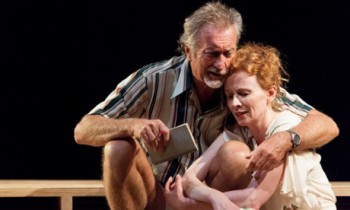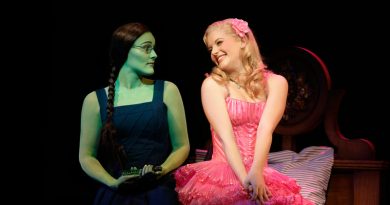Review: Travelling North, Sydney Theatre Company
2014 might as well be the year of David Williamson in Sydney, with eight of the prolific playwright’s productions being staged across the city. Sydney Theatre Company’s outing is the first, and its first show of the year. One hopes that this is a slow-burn beginning to the season and not something more unfortunate.
Travelling North opens on a stark, David Fleischer stage. It’s empty, curiously devoid of impression, feeling, or place. Sadly, that echo-chamber carries into the production itself; the actors move like the proverbial chess pieces on the board, seemingly unable to access the grief, confusion, passion somewhere inside the characters, the thing that makes them human.

The play is perhaps not Williamson’s best, or certainly not his most political; this play turns inward to Frank (Bryan Brown) and Frances (Alison Whyte), an older couple who re-settle up north away from their adult children and their assorted life ties that bind. Frances misses the culture, the theatre, having something to do; Frank loves the quiet and the fishing, but is slower becoming more and more ill with a host of problems, namely his heart.
Questions are asked, and some of them are big ones: how much loyalty do you owe your possibly dying partner of a year, the one who refuses to marry you? How do you know if you’re in love and following your own wants when you’ve fallen into the habit of following suggestion? How do families work when you’re older; what does it take to make a family, a woman, a man successful? How do you die gracefully? And also, was the Vietnam War one Australia should have been involved in?
For a show with so many questions it seems odd that we don’t ever quite explore them; the script is light but the warmth of humanity seems to be missing in the actors, too. The most dynamic moments came from Harriet Dyer and the impossibly ageless Sara West as Frances’ married daughters; they bring a refreshing naturalism to their period costumes and hair. Audience members laugh at their clothing, but then they listen, which is more that can be said for Andrew Tighe’s Freddy, gamely donning the short stubbies and sideburns of the 1970’s.
There are flickering moments of warmth and they seem to come almost in silhouette: from the grace of Alison Whyte, head bowed and barefoot, taking stock of her new home; from Russell Kiefel as Saul, a hapless doctor who just can’t corral his patient; and from Brown and Whyte who connect in silence and stillness as a pre-recorded phone conversation plays. These touches of Andrew Upton’s directorial hand are gentle and effective; unfortunately, they are too gentle, and his direction feels otherwise too distant, too inaccessible to revive this story.




